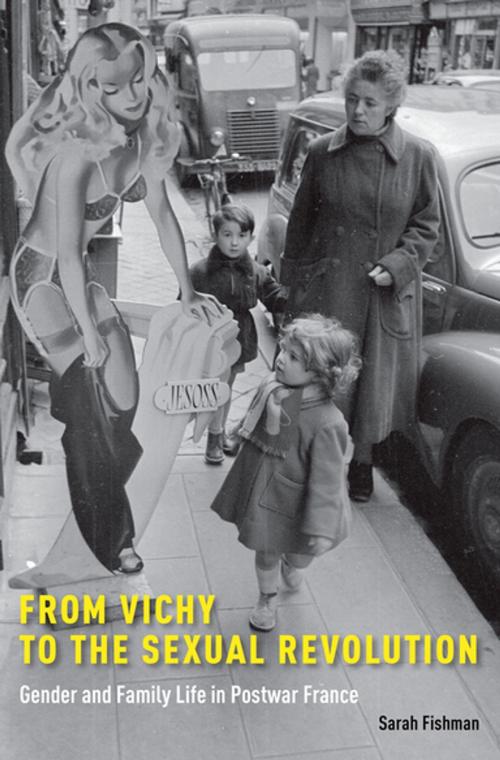From Vichy to the Sexual Revolution
Gender and Family Life in Postwar France
Nonfiction, History, France, Modern, 20th Century| Author: | Sarah Fishman | ISBN: | 9780190248642 |
| Publisher: | Oxford University Press | Publication: | December 15, 2016 |
| Imprint: | Oxford University Press | Language: | English |
| Author: | Sarah Fishman |
| ISBN: | 9780190248642 |
| Publisher: | Oxford University Press |
| Publication: | December 15, 2016 |
| Imprint: | Oxford University Press |
| Language: | English |
At the end of World War II, France discarded not only the Vichy regime but also the austere ideology behind it. Under the veneer of a conservative vision of family characterized by the traditional structure of a male breadwinner and female homemaker, the conception of love, marriage, and parenting began changing in the years immediately after the Liberation. In the 1950s, France experienced rapid economic development alongside a baby boom, changing from a rural country worn out by economic depression, war, and occupation into an urban, industrial, and affluent nation. Meanwhile, the works of Sigmund Freud, Simone de Beauvoir, and Alfred Kinsey began to influence popular culture and shape how people thought about their partners, their children, and themselves. Little more than twenty years after Vichy was abolished, France had already entered the early phases of a dramatic sexual revolution, laying the groundwork for the turmoil of May 1968. From Vichy to the Sexual Revolution explores the factors that led to such radical changes in French notions of gender roles, family structures, and sexuality. Sarah Fishman follows French women's path toward emancipation from winning suffrage in 1945 to the social movements of 1960s, painting a broad view of shifting habits and ideas about love, courtship, sex, marriage, parenting, childhood, and adolescence. She surveys a wide range of sources, including juvenile court cases, inexpensive guidebooks on marriage and childbirth, and popular magazines--Marie Claire and Elle most notably, where iconic columnists such as Marcelle Auclair and Marcelle Ségal answered readers' letters and dispensed intimate and inspirational advice to millions of women. Fishman deftly links economic, political, and social transformations, showing how the vision of family shifted away from a rigid structure dominated by the authority of the father toward a more dynamic group characterized by engaged relationships between parents and children. A sweeping social history of postwar France, this book illuminates the extraordinary impact that national policies have on ordinary lives.
At the end of World War II, France discarded not only the Vichy regime but also the austere ideology behind it. Under the veneer of a conservative vision of family characterized by the traditional structure of a male breadwinner and female homemaker, the conception of love, marriage, and parenting began changing in the years immediately after the Liberation. In the 1950s, France experienced rapid economic development alongside a baby boom, changing from a rural country worn out by economic depression, war, and occupation into an urban, industrial, and affluent nation. Meanwhile, the works of Sigmund Freud, Simone de Beauvoir, and Alfred Kinsey began to influence popular culture and shape how people thought about their partners, their children, and themselves. Little more than twenty years after Vichy was abolished, France had already entered the early phases of a dramatic sexual revolution, laying the groundwork for the turmoil of May 1968. From Vichy to the Sexual Revolution explores the factors that led to such radical changes in French notions of gender roles, family structures, and sexuality. Sarah Fishman follows French women's path toward emancipation from winning suffrage in 1945 to the social movements of 1960s, painting a broad view of shifting habits and ideas about love, courtship, sex, marriage, parenting, childhood, and adolescence. She surveys a wide range of sources, including juvenile court cases, inexpensive guidebooks on marriage and childbirth, and popular magazines--Marie Claire and Elle most notably, where iconic columnists such as Marcelle Auclair and Marcelle Ségal answered readers' letters and dispensed intimate and inspirational advice to millions of women. Fishman deftly links economic, political, and social transformations, showing how the vision of family shifted away from a rigid structure dominated by the authority of the father toward a more dynamic group characterized by engaged relationships between parents and children. A sweeping social history of postwar France, this book illuminates the extraordinary impact that national policies have on ordinary lives.















